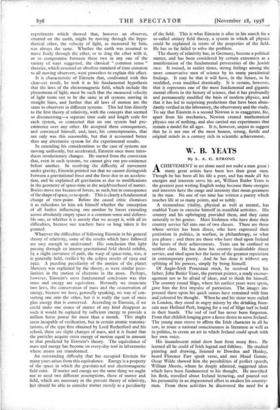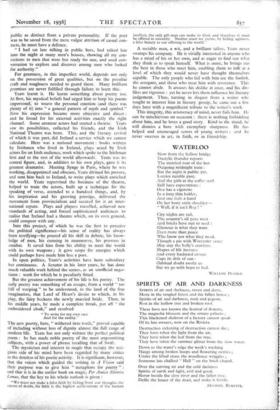W. B. YEATS
By L. A. G. STRONG
ACHIEVEMENT in art alone need not make a man great : many great artists have been less than great men. Though he has been all his life. a poet, and has made all his energies and interests serve his art, William Butler. Yeats is the greatest poet writing English today because those energies and interests have the range and intensity that mean greatness in the man. No one of our time has written a poetry which touches life at so many points, and so nobly.
A tremendous yitality, physical as well as mental, has enabled Yeats to exercise himself in manifold activities. His country and his upbringing provided them, and they came naturally to his genius. Most Irishmen who have done their country service fall into one of two classes. There are those whose service has been direct, who have expressed their patriotism in politics, in warfare, in philanthropy, or what you please : and there are those who have shed upon Ireland the lustre of their achievements. Yeats can be confined to neither class. He has done his country incalculable direct service, and shed upon her the lustre of the greatest reputation in contemporary poetry. And he has done it without any splitting of his powers, simply by being himself.
Of Anglo-Irish Protestant stock, he received from his father, John Butler Yeats, the portrait painter, a ready encour- agement not to be afraid of ideas, and to think for himself. The country round Sligo, where his earliest years were spent, gave him the first impulse of patriotism. The images im- pressed there upon his quick senses have remained with him and' coloured his thought. When he and his sister were exiled in London, they stood in angry misery by the drinking foun- tain near Holland Park, longing for a sod of Sligo turf to hold in their hands. The sod of turf has never been forgotten. From that childish longing grew a fierce desire to serve Ireland.
The young man strove to affirm the Irish character in all he saw, to rouse a national consciousness in literature as well as in politics, to create an art in which Ireland could speak with her own voice.
His incandescent mind drew heat from many fires. He learned all he could of Irish legend and folklore. He studied painting and drawing, listened to _Dowden and Henley, heard Florence Farr speak verse, and met Maud Gonne. Oscar Wilde showed him the possibilities of perfect speech, William Morris, whom he deeply admired, suggested ideas which, have been fundamental to his thought. He mortified his flesh, travelled about Ireland lecturing, and poured out his personality in an impassioned effort to awaken his country- men. From these activities he discovered the need for a public as distinct from a private personality. If the poet was to be saved from the mere vulgar attrition of casual con- tacts; he must have a defence.
" I had sat late tilling in public bars, had talked late into the night at many men's houses, showing all my con- victions to men that were but ready for one, and used con- versation • to explore and discover among men who looked for authority."
For greatness, in this imperfect world, depends not only on the possession of great qualities, but on the peculiar craft and toughness needed to guard them. Many brilliant promises are never fulfilled through failure to learn- this.
Yeats learnt it. He learnt something about poetry too. At first, his mystical beliefs had-urged him to keep his poems impersonal; to weave the personal emotion (and there was plenty of it) into " a general pattern of myth and symbol." Now his expression became more objective and direct : and he found for his external activities exactly the right channel. Some amateur actors had started a theatre. Yeats saw its possibilities, collected his friends, and the Irish National Theatre was born. This, and the literary revival of which it was part, did Ireland a service which we cannot calculate. Here was a national movement : books written by Irishmen who lived in Ireland, plays acted by Irish actors for an Irish audience, work which spoke to the Irishman first and to the rest of the world afterwards: Yeats was its central figure, and, in addition to his own plays, gave it its greatest dramatist. Meeting Synge in Paris, where he was working, disappointed and obscure, Yeats divined his powers, and sent him back to Ireland, to write plays which enriched the world. Yeats supervised the business of the theatre, helped to train the actors, built up a- technique for the speaking of verse, attended to a hundred things, and, by his inspiration and his growing prestige, delivered the movement from provincialism and secured for it an inter- national repute. Plays and players travelled, achieved new . standards of acting, and forced sophisticated audiences to realise that Ireland had a theatre which, on its own ground, could- compare with any.
Into this project, of which he was the first to perceive the political significance—his sense of reality has always been terrifyifig—he poured all his skill in debate, his know- ledge of men, his cunning in manoeuvre, his prowess in combat. It saved him from his ability to meet the world with its own weapons ; it gave scope for energies which could perhaps have made him less a poet.
In open politics, Yeats's activities have been subsidiary but continuous. A Senator in his later years, he has done much valuable work behind the scenes, as an unofficial nego- tiator : work for which he is peculiarly fitted.
But the greatest achievement of his life is his poetry. The early poetry was something of an escape, from a world " too full of weeping " to be understood, to the land of the free imagination, that Land of Heart's desire to which, in his play, the fairy beckons the newly married bride. Then, in his middle years, he made a complete break, put off " the embroidered cloak," and resolved
" To write for my own race And for the reality."
The new poetry, bare, " withered into truth," proved capable of including without loss of dignity almost the full range of modernlife. Yeats has not only written the perfect political poem : he has made noble poetry of the most unpromising subjects, with a power of phrase recalling that of Swift.
The Mysticism and interest in magic that occupy the reli- gious side of his mind have been regarded by many critics as the detritus of his poetic activity. It is significant, however, that the voices which guided the writing in A Vision said their purpose was to give him " metaphors for poetry " : and that it is in the earlier book on magic, Per Arnica Silentia Lunae, that the key to his whole outlook is given : "We mint not Make a false faith by hiding-from our thoughts the causes Of doubt, fair faith is the highest achievement of 'the human
intellect, the only gift man can make to God, and therefore it must be offered in sincerity. Neither must we create, by hiding ugliness, a false beauty as our offering to the world."
A sociable man, a wit, and a- brilliant • talker, Yeats never swamps his company. He is vividly interested in anyone who has a mind of his or her own, and as eager to find out what they think as to speak himself. What is more, he brings out the best in those who meet him, enabling them to talk at a level of which they would never have thought themselves capable. The only people who fail with him are the foolish, the arrogant, and those who treat him with reverence. This he cannot abide. It arouses his dislike at once, and his dis- likes are vigorous : yet he never lets them influence his literary judgement. Thus, turning in disgust from a writer who sought to interest him in literary gossip, he came out a few days later with a magnificent tribute to the writer's work.
This integrity, this aristocracy of mind, never fails him. He can be mischievous on occasion : there is nothing forbidding about him, and he loves a good story. Kind to the. timid, he will dismiss a bore with exemplary sharpness. He has helped and encouraged scores of young writers : and he never swerves in art, in faith, or in friendship.

























































 Previous page
Previous page